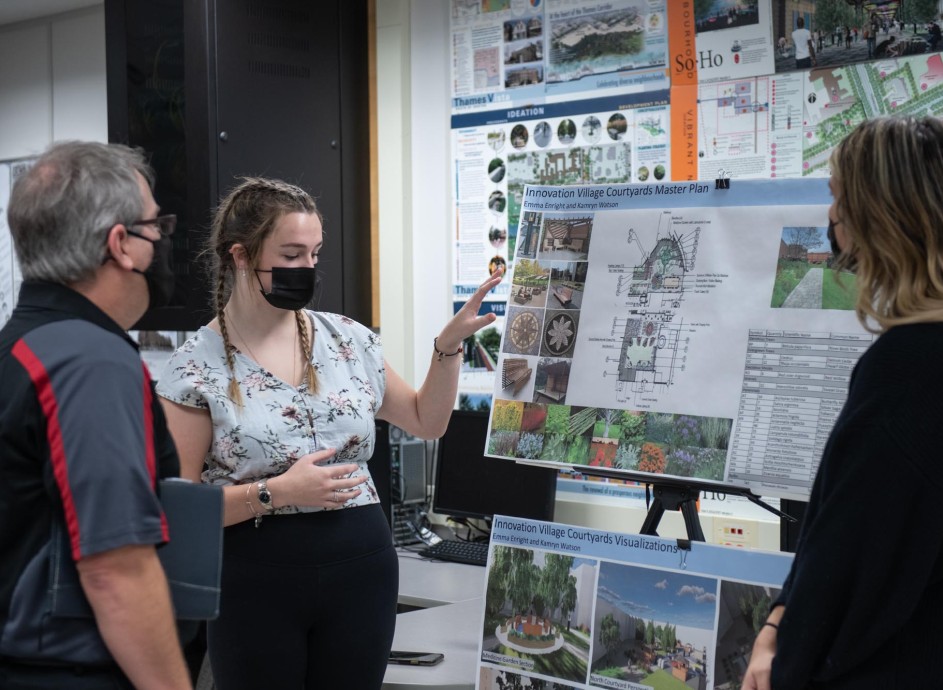Landscape Design

*Domestic applicants include Canadian citizens, permanent residents, protected persons and Convention refugees.
Canada’s only three-year Landscape Design Ontario College Advanced Diploma program offers a hybrid studio learning model, which combines traditional studio practice with computer-aided design to create designs and technical working drawings for a variety of project scales. Students learn design supported through emerging and current industry-based computer technologies in order to visualize, communicate and present designs using CADD, 3D modeling, visualization, illustration and digital photography techniques.
Our program combines coursework with co-op work terms so students gain real-world work experiences. Students discover first-hand the links between coursework and the profession of landscape design, bringing what was learned in each work term back to the classroom to continue building key employability skills.
Program field trips include botanical gardens, residential sites, Landscape Ontario designer conferences and trade shows. There are also opportunities to participate in exchanges or international trips to experience some of the world’s most historic cities and gardens in Italy, Spain, England and Brazil.
Landscape Design is a co-operative program of study providing training in the design of many types of landscape areas, with emphasis on residential landscape design as well as experience with commercial and institutional sites. A variety of skills in areas such as drafting, computer-aided design, three dimensional modeling, design illustration and visualization are combined with the knowledge of design theory, plant and hard materials, landscape construction and new technologies to provide students with the skills necessary to source employment in the expanding field of landscape design.
Qualifying graduates of the Landscape Design program have the option to receive advanced standing into a related Honours Bachelor's Degree in the Environmental Design and Planning program at Fanshawe College as well as the Landscape Architecture program at the University of Guelph where they may continue their studies. Previous graduates have also pursued degrees at a wide range of universities in both Canada and Europe.
The Landscape Design program offers a cooperative education component, where students gain first-hand experience of the diversity of the landscape profession while working in their chosen field. Employers post job openings starting in January to recruit students for these work terms. Job fairs targeting our students are also held early in the year. Many opportunities are available for those new to the landscape field as well as those with previous work experience.
Graduates of Fanshawe’s Landscape Design program are valued for their understanding of the design process, technical construction, visualization, communication and problem-solving skills. With your advanced diploma, you will be able to pursue dynamic and challenging careers with:
· landscape architecture, planning and environmental firms
· landscape contractors
· design-build landscape companies
· design offices
· landscape sales and marketing
· municipal and provincial offices
· nurseries and garden centres
Did you know Fanshawe consistently ranks high in graduation employment rates among large colleges in Ontario?
Fall | Winter | Summer | |
| Year 1 | Level 1 | Level 2 | Work Term 1 |
| Year 2 | Level 3 | Level 4 | Work Term 2 |
| Year 3 | Work Term 3/Level 5 | Level 6 |
|

“I decided I needed to go back to school after my degree, as I wanted a career in shaping public green space and the Landscape Design program helped me gain all the hard and soft skills to reach this goal. I do not think I would have had near the success I have had attaining my career goal within three years of graduating, if it was not for deciding to go to Fanshawe. Best part was, I had fun, taking advantage of opportunities to travel abroad and became very close with my classmates during long nights of hard work.”
The graduate has reliably demonstrated the ability to
1. craft landscape designs that successfully integrate people into outdoor environments.
2. apply principles of site engineering to complete a landscape design.
3. use the computer as a tool to communicate all aspects of the landscape design process.
4. utilize appropriate communication tools to convey design ideas.
5. recognize the importance of landscape maintenance and management in design.
6. prepare accurate quantity and cost estimates for a project.
7. plan, execute, and conclude a wide range of landscape projects.
8. identify environmental effects of projects and take appropriate steps to avoid environmental damage and promote healthy ecosystems.
9. act in a professional manner, maintain professional relationships, and communicate effectively with clients, co-workers, supervisors, and others.
10. develop strategies for ongoing personal and professional development to enhance work performance and career opportunities and to keep pace with industry changes.
Shelley Stephenson
| Test | Score |
|---|---|
| TOEFL iBT | 79 |
| IELTS Academic | Overall score of 6.0 with no score less than 5.5 in any of the four bands |
| CAEL | Overall score of 60 with no score less than 50 in any of the four bands. score of 80 in listening |
| PTE Academic | 53 |
| Cambridge English | Overall score of 169 with no language skill less than 162 |
| ESL4/GAP5 | Minimum grade of 80% in Level 8, 75% in Level 9, or 70% in Level 10 |
| Duolingo | Overall score of 105, with no score lower than 95 |
| Level 1 | ||||
| Take all of the following Mandatory Courses: | ||||
| WRIT-1036 | Reason & Writing 1-Art & Design | 3 | ||
| This course introduces students to essential principles of reading, writing, and reasoning at the postsecondary level. Students will identify, summarize, analyze, and evaluate multiple short readings and write persuasive response essays to develop their vocabulary, comprehension, grammar, and critical thinking. | ||||
| DESG-1065 | Landscape Design Studio 1 | 4 | ||
| This studio-based course is an introduction to the landscape design process. Lectures, studio exercises, group and individual projects are used to demonstrate, explore and practice the techniques, approaches and compositional principles of design. Assignments focus on the application of a design process for problem-solving as it relates to the design of small residential and commercial sites. Students will acquire and practice landscape design techniques. | ||||
| LAND-1002 | Site Inventory & Evaluation | 1.5 | ||
| This course introduces the student to the process of assessing a site to determine the various elements that will impact on the development of an effective landscape solution. Classes will include practical field experience and small group exercises. Various survey and measurement tools will be used to accurately inventory existing site conditions and record this information. The impact of this data on the design, construction and maintenance of a garden will be discussed. | ||||
| DESG-1075 | Presentation & Illustration 1 | 2 | ||
| This course introduces students to the basic drafting, sketching and illustration skills required to develop and present landscape design ideas. Classes will explore various line-drawing and colour rendering techniques used to develop and present design ideas to clients. Both free-hand and manual drawings techniques will be used to show plan elements, elevation/sections, axonometric and 1-point perspective drawings. | ||||
| COOP-1020 | Co-operative Education Employment Prep | 1 | ||
| This workshop will provide an overview of the Co-operative Education consultants and students' roles and responsibilities as well as the Co-operative Education Policy. It will provide students with employment preparatory skills specifically related to co-operative education work assignments and will prepare students for their work term. | ||||
| DESG-1066 | Landscape Materials | 2 | ||
| This course introduces the student to the materials they will encounter when constructing and designing landscape projects. Landscape Materials explores the qualities and applications of aggregates, wood, concrete, masonry, natural stone, and geo-textiles. The learner will be able to identify, describe, and understand how each material could be used in various landscape projects, its durability and subsequent maintenance. The student will be able to perform quantity take off calculations for various landscape materials. | ||||
| CADD-1010 | Computer Drafting for Design 1 | 3 | ||
| An introductory computer drafting software course introduces students to the fundamentals of DynaScape & AutoCAD as used in Landscape Design. Students will demonstrate their ability to prepare two-dimensional scaled plan drawings complete with standard file management, drawing setup layers, line types, dimension styles, text, titlebocks and plotting. This course is a pre-requisite for CADD 3026. | ||||
| HORT-1082 | Plant Studies 1 | 3 | ||
| This course introduces students to woody plant naming systems and basic plant anatomy physiology & growth. Through woody plant walks, both native and cultured plants will be introduced and studied on site. How and where these plants can be used in plantings will be discussed. At the conclusion of the course the learner will be able to identify and give basic cultural information on over 150 hardy deciduous trees, shrubs and vines within Ontario hardiness Zones 2-6 suitable for use in the landscape. | ||||
*Total program costs are approximate, subject to change and do not include the health and dental plan fee, bus pass fee or program general expenses.